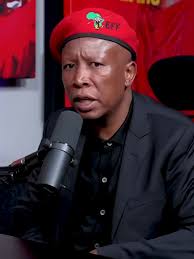South African opposition leader, Julius Malema has commended Nigeria’s contributions to his country’s freedom from apartheid and denounced xenophobia as “a betrayal of African unity.”
Malema, founder and leader of the Economic Freedom Fighters (EFF), spoke at the opening of the 2025 Annual General Conference of the Nigerian Bar Association (NBA) held at the International Conference Centre, Enugu, on Sunday evening.
He said Nigeria was among the nations that stood firmly by South Africa during its darkest years.
*“I must reiterate once again that it is a deep honour to stand before you today in Enugu State in Nigeria, a country that holds a special place in the hearts of all South Africans.
We understand history, feel solidarity and appreciate the sacrifices made by others in the course of our history. Nigeria is not just another African country to us,”* he said.
He recalled that when South Africa was under apartheid, Nigeria established the Southern African Relief Fund and mobilised its citizens to contribute to the liberation struggle.
*“Even as it faced its own challenges at home, these initiatives raised millions of dollars to support the liberation of South Africa as people paid directly from their salaries.
Nigerian students sacrificed a portion of their income, through the Mandela Tax, which supported an educational training programme for Black South Africans.
A successive Nigerian government never stopped in their material and moral support for South Africa’s liberation.
In fact, Nigerian government boycotted the 1976 Olympic Games and the 1979 Convention of the Multiculturalists,”* Malema said.
He added that Nigerian students also organised protests in opposition to apartheid.
*“We can neither forget all those who stood by us during difficult times, nor can we forget that when Nelson Mandela was released from prison in 1990, one of his earliest international visits was Lagos and Abuja to personally thank the Nigerian people.
These gestures are the foundation of a bond sealed in blood and sacrifice. However, this history must not remain in the past.
This bond between South Africa and Nigeria must be carried forward into the present, not just in political sentiment but in concrete economic collaboration as both our nations stand as giants of the continent,”* he stressed.
Malema urged closer cooperation in sectors such as mining, infrastructure, financial systems, oil and gas, and cultural exchange.
*“Together, we hold the keys to Africa’s industrialisation and economic independence when we consider what lies beneath our soils.
Nigeria is blessed with abundant oil, natural gas, and a growing agricultural sector.
South Africa holds some of the richest deposits of platinum, gold, manganese, and coal in the world.
Combined, we possess the minerals that power modern technology, the energy resources that fuel global industry and the human capital to build a self-sufficient continent,”* he said.
He expressed regret that, despite abundant resources, both countries remain tied to neo-colonial economic structures.
“These raw materials are exported to Europe, America, and Asia only to be sold back to us at crazy prices as finished goods,” he decried.
According to him, both nations should process their resources locally and invest jointly in energy, agriculture, and technology to drive Africa’s development.
He noted the success of South African companies in Nigeria such as MTN, SPAR, and MultiChoice, while acknowledging the growing influence of Nigerian music, films, and literature in South Africa.
However, Malema said cooperation had been uneven, citing suspicion and xenophobia as challenges.
He specifically condemned hostility against Nigerians and other Africans in South Africa, describing the attacks, looting, and killings as “a betrayal of African unity and a sickness born of poverty.”
(NAN)


